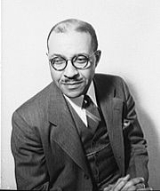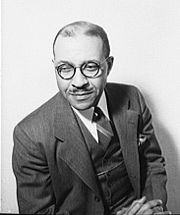
Charles S. Johnson
Encyclopedia

United States
The United States of America is a federal constitutional republic comprising fifty states and a federal district...
sociologist, first black president of historically black
Historically Black Colleges and Universities
Historically black colleges and universities are institutions of higher education in the United States that were established before 1964 with the intention of serving the black community....
Fisk University
Fisk University
Fisk University is an historically black university founded in 1866 in Nashville, Tennessee, U.S. The world-famous Fisk Jubilee Singers started as a group of students who performed to earn enough money to save the school at a critical time of financial shortages. They toured to raise funds to...
, and a lifelong advocate for racial equality and the advancement of civil rights
Civil rights
Civil and political rights are a class of rights that protect individuals' freedom from unwarranted infringement by governments and private organizations, and ensure one's ability to participate in the civil and political life of the state without discrimination or repression.Civil rights include...
for African Americans and all other ethnic minorities. He preferred to work in coalition with liberal white groups in the South
Southern United States
The Southern United States—commonly referred to as the American South, Dixie, or simply the South—constitutes a large distinctive area in the southeastern and south-central United States...
quietly as a "sidelines activist" concerned to get practical results. His position is often contrasted with that of the towering figure in this field, W. E. B. Du Bois, who was a powerful and militant advocate for his people and who described Johnson as "too conservative." But this contrast should be seen in the context of the 1930s and 1940s, with complete segregation
Racial segregation
Racial segregation is the separation of humans into racial groups in daily life. It may apply to activities such as eating in a restaurant, drinking from a water fountain, using a public toilet, attending school, going to the movies, or in the rental or purchase of a home...
and fierce discrimination pervading the South. He was angry and unwavering in personal terms in his opposition to this oppressive system yet hoped he had the strategy to significantly change race relations in terms of the short term practical gains.
Born in the South in turn-of-the century in Bristol, Virginia
Virginia
The Commonwealth of Virginia , is a U.S. state on the Atlantic Coast of the Southern United States. Virginia is nicknamed the "Old Dominion" and sometimes the "Mother of Presidents" after the eight U.S. presidents born there...
, Johnson went north to Chicago and the University of Chicago
University of Chicago
The University of Chicago is a private research university in Chicago, Illinois, USA. It was founded by the American Baptist Education Society with a donation from oil magnate and philanthropist John D. Rockefeller and incorporated in 1890...
where he was part of the Great Migration
Great Migration (African American)
The Great Migration was the movement of 6 million blacks out of the Southern United States to the Northeast, Midwest, and West from 1910 to 1970. Some historians differentiate between a Great Migration , numbering about 1.6 million migrants, and a Second Great Migration , in which 5 million or more...
. After the tragic race riot
Race riot
A race riot or racial riot is an outbreak of violent civil disorder in which race is a key factor. A phenomenon frequently confused with the concept of 'race riot' is sectarian violence, which involves public mass violence or conflict over non-racial factors.-United States:The term had entered the...
of 1919 he did much of the research which showed how the riot had deep roots in denial of economic and social opportunity to African Americans. The subsequent book, The Negro in Chicago became the classic model for comprehensive commission reports.
In the 1920s Johnson moved to New York City
New York City
New York is the most populous city in the United States and the center of the New York Metropolitan Area, one of the most populous metropolitan areas in the world. New York exerts a significant impact upon global commerce, finance, media, art, fashion, research, technology, education, and...
where he became research director for the National Urban League
National Urban League
The National Urban League , formerly known as the National League on Urban Conditions Among Negroes, is a nonpartisan civil rights organization based in New York City that advocates on behalf of African Americans and against racial discrimination in the United States. It is the oldest and largest...
and "entrepreneur of the Harlem Renaissance
Harlem Renaissance
The Harlem Renaissance was a cultural movement that spanned the 1920s and 1930s. At the time, it was known as the "New Negro Movement", named after the 1925 anthology by Alain Locke...
," the creative upsurge by African American writers and artists of that time.
Johnson yearned to return to the South, not only to study race relations but to change them. He moved to Nashville
Nashville, Tennessee
Nashville is the capital of the U.S. state of Tennessee and the county seat of Davidson County. It is located on the Cumberland River in Davidson County, in the north-central part of the state. The city is a center for the health care, publishing, banking and transportation industries, and is home...
, taking a position as head of sociology at Fisk University
Fisk University
Fisk University is an historically black university founded in 1866 in Nashville, Tennessee, U.S. The world-famous Fisk Jubilee Singers started as a group of students who performed to earn enough money to save the school at a critical time of financial shortages. They toured to raise funds to...
. There he wrote or directed countless studies of the way in which combined economic and social factors produced an oppressive racial structure. Two of these books have become classics: Shadow of the Plantation (1934), and Growing up in the Black Belt
Black Belt (region of Alabama)
The Black Belt is a region of the U.S. state of Alabama, and part of the larger Black Belt Region of the Southern United States, which stretches from Texas to Maryland. The term originally referred to the region underlain by a thin layer of rich, black topsoil developed atop the chalk of the Selma...
(1940). Johnson lived long enough to celebrate the landmark Supreme Court
Supreme Court of the United States
The Supreme Court of the United States is the highest court in the United States. It has ultimate appellate jurisdiction over all state and federal courts, and original jurisdiction over a small range of cases...
decision, Brown v. Board of Education
Brown v. Board of Education
Brown v. Board of Education of Topeka, 347 U.S. 483 , was a landmark decision of the United States Supreme Court that declared state laws establishing separate public schools for black and white students unconstitutional. The decision overturned the Plessy v. Ferguson decision of 1896 which...
, which declared racial segregation in the public schools unconstitutional. Johnson played a key role in the effort to implement the decision in the face of "massive resistance
Massive resistance
Massive resistance was a policy declared by U.S. Senator Harry F. Byrd, Sr. on February 24, 1956, to unite other white politicians and leaders in Virginia in a campaign of new state laws and policies to prevent public school desegregation after the Brown v. Board of Education Supreme Court decision...
." Johnson's work and that of his peers helped pave the way for the civil rights legislation of the Sixties.
Johnson was a member of Alpha Phi Alpha
Alpha Phi Alpha
Alpha Phi Alpha is the first Inter-Collegiate Black Greek Letter fraternity. It was founded on December 4, 1906 at Cornell University in Ithaca, New York. Its founders are known as the "Seven Jewels". Alpha Phi Alpha developed a model that was used by the many Black Greek Letter Organizations ...
fraternity. He was also a charter member of the Zeta Rho chapter of Phi Mu Alpha Sinfonia
Phi Mu Alpha Sinfonia
Phi Mu Alpha Sinfonia is an American collegiate social fraternity for men with a special interest in music...
music fraternity, chartered at Fisk in 1953.
Notable works
Some of Johnson notable works include:- Editor, Opportunity: a Journal of Negro Life, the official publication of the National Urban League
- Editor, Ebony and Topaz, 1928
- The Negro in American civilization; a study of Negro life and race relations in the light of social research. NY: H. Holt, 1930.
- The collapse of cotton tenancy. Summary of Field studies & statistical surveys, 1933-35 by Charles S. Johnson, Edwin R. Embree [and] W. W. Alexander. Chapel Hill: U of North Carolina P, 1935.
- Shadow of the plantation Chicago: U of Chicago P, 1966, c1934.
- Growing up in the Black Belt; Negro youth in the rural South. With an introd. by St. Clair DrakeSt. Clair DrakeSt. Clair Drake was an African-American sociologist and anthropologist.Drake was born in Suffolk, Virginia. Upon graduation from Hampton Institute in 1931, he became involved with The Society of Friends in the south...
. Prepared for the American Youth Commission, American Council on Education. NY: Schocken Books, 1967, c1941.
- "The Negro Renaissance and Its Significance." (1954) Remembering the Harlem Renaissance. Ed. Cary D. Wintz. NY: Garland, 1996. 226-34.
- The Negro college graduate NY: Negro Universities Press, 1969.
- Education and the cultural process; papers presented at symposium commemorating the seventy-fifth anniversary of the founding of Fisk UniversityFisk UniversityFisk University is an historically black university founded in 1866 in Nashville, Tennessee, U.S. The world-famous Fisk Jubilee Singers started as a group of students who performed to earn enough money to save the school at a critical time of financial shortages. They toured to raise funds to...
, April 29-May 4, 1941. Edited by Charles S. Johnson. NY: Negro Universities Press,1970. LC2717 E36

